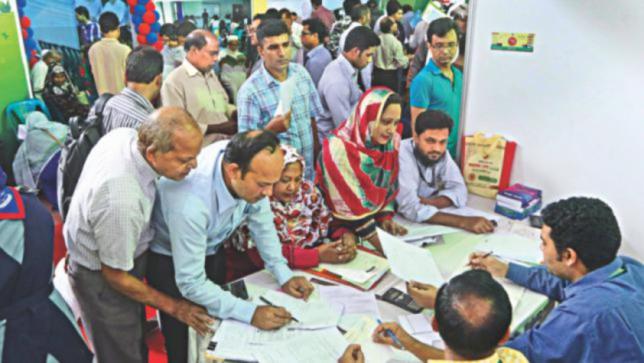Published in The Daily Star on Monday, 14 November 2016
MACRO MIRROR
Not a Taxing Affair – Dr Fahmida Khatun
 It is encouraging to note that the National Income Tax Fair is becoming increasingly useful and popular among ordinary tax payers in Bangladesh. In a country with a population of 160 million, but only 1.2 million tax returns, such efforts are effective indeed. Reports say that response from people of various sections has been tremendous. As a result, revenue collection during this year’s week-long income tax fair reached a record high (compared to the last six years) of over Tk. 2129.67 crore. People submitted tax returns, paid taxes and collected their e-Tax Identification Number while availing other online services. This reflects the awareness among people regarding their responsibility as citizens of Bangladesh. This also indicates that large sections of people who have the ability to pay and fall in the tax brackets are willing to pay their taxes. As responsible citizens, they know that in order to progress and receive services from the government, they have to contribute towards the government’s exchequer.
It is encouraging to note that the National Income Tax Fair is becoming increasingly useful and popular among ordinary tax payers in Bangladesh. In a country with a population of 160 million, but only 1.2 million tax returns, such efforts are effective indeed. Reports say that response from people of various sections has been tremendous. As a result, revenue collection during this year’s week-long income tax fair reached a record high (compared to the last six years) of over Tk. 2129.67 crore. People submitted tax returns, paid taxes and collected their e-Tax Identification Number while availing other online services. This reflects the awareness among people regarding their responsibility as citizens of Bangladesh. This also indicates that large sections of people who have the ability to pay and fall in the tax brackets are willing to pay their taxes. As responsible citizens, they know that in order to progress and receive services from the government, they have to contribute towards the government’s exchequer.
However, such contributions have to be multiplied with far more efforts, because taxation is a major instrument for mobilising domestic resources for all economies. Tax performance in Bangladesh has not been encouraging till now. The current tax-GDP ratio is well below the requirement for a dynamic economy that looks forward to moving towards the next trajectory of development. The tax-GDP ratio of Bangladesh was only 10.3 percent in FY2016, a rate that has risen from 5 percent in the early 80s, and is still much lower compared to the neighbouring countries.
 Despite the government’s realisation of the need to increase income tax, its growth has been far less significant. For example, in FY2016 the government originally targeted a 33.3 percent growth of income tax which was revised downwards to only 8 percent. Finally, the actual growth of income tax in FY2016 was 12.3 percent. By FY2019, the country aims to increase its tax-GDP ratio to 15.3 percent. For FY2017, the revenue-GDP ratio has been set at 12.4 percent and the tax-GDP ratio at 10.4 percent. These targets are still not enough to advance at the pace the country aims for – to become a higher middle income country by 2021.
Despite the government’s realisation of the need to increase income tax, its growth has been far less significant. For example, in FY2016 the government originally targeted a 33.3 percent growth of income tax which was revised downwards to only 8 percent. Finally, the actual growth of income tax in FY2016 was 12.3 percent. By FY2019, the country aims to increase its tax-GDP ratio to 15.3 percent. For FY2017, the revenue-GDP ratio has been set at 12.4 percent and the tax-GDP ratio at 10.4 percent. These targets are still not enough to advance at the pace the country aims for – to become a higher middle income country by 2021.
In the context of emerging global economic and political scenario, it is increasingly becoming clear that the flow of foreign aid to developing countries is declining and will continue to do so in the coming years. Hence, domestic resource mobilisation has taken the centre stage in the development discourse. Sustainable development path therefore, may be jeopardised if countries rely on foreign aid to a great extent. Domestic resource mobilisation has also received renewed importance in the Sustainable Development Goals as an important means of implementation of these goals.
Domestic resources, unlike foreign aid, provide a predictability of resource flow to make allocations for the medium term fiscal planning in a country. Volatility and uncertainty in aid flows create difficulty in budget management. Adequate domestic resources create fiscal space for the country to prioritise its spending in line with the policy priorities and political commitments of the government. It also gives flexibility as opposed to conditionalities of foreign aid which still exist despite developed countries’ commitments to do away with aid conditionality under the Paris Declaration on Aid Effectiveness in 2005. Another important reason for improving domestic resource mobilisation through taxation is that it can create the sense of participation among people in the development process of the country. This, in turn, can act as a mechanism to create pressure on the public representatives to be accountable and transparent about the use of resources.
Surely, a conscious effort to expand the tax net and realisation of taxes is being observed in recent years in Bangladesh. Various measures and pledges of the government are reflections of such attempts. E-filing of income tax returns, installment of a tax calculator software on the website of NBR, restructuring of manpower and other facilities of the income tax department, motivational programmes for taxpayers of income and value added taxes, introduction of tax cards for the highest taxpayers, reforms in VAT administration, etc. are expected to bring in positive results.
However, in order to enhance efficiency and effectiveness of the tax administration, policy and institutional reforms are key. In view of the size of the population and the prospective number of taxpayers, the need for more human resources and higher skills has been emphasised time and again. Also, the completion of full automation of the NBR is crucial to improve efficiency. Tax evasion and avoidance are problems across various income groups and economic sectors. A study by the NBR indicates that the amount of tax evasion of income tax at source amounts to Tk. 20,000 crore per year. Implementation of e-governance through use of ICT can reduce such evasions. It will also help establish an easy tax collection procedure and increased compliance. Participation of a large number of taxpayers in the income tax fair indicates that people want to have a hassle free tax system that will respect and cooperate with taxpayers.
Effective resource mobilisation efforts also depend on the utilisation of resources. If the taxpayers are not convinced about the services they would get from the government in return, if they are not confident about the utilisation of their hard earned money, people may lack the motivation to pay taxes. Transparency and accountability of resource allocation for development are crucial for higher domestic resource mobilisation. How much of this resource is used for employment generation and poverty reduction are key factors for successful resource mobilisation efforts.
The writer is Research Director at the Centre for Policy Dialogue.

